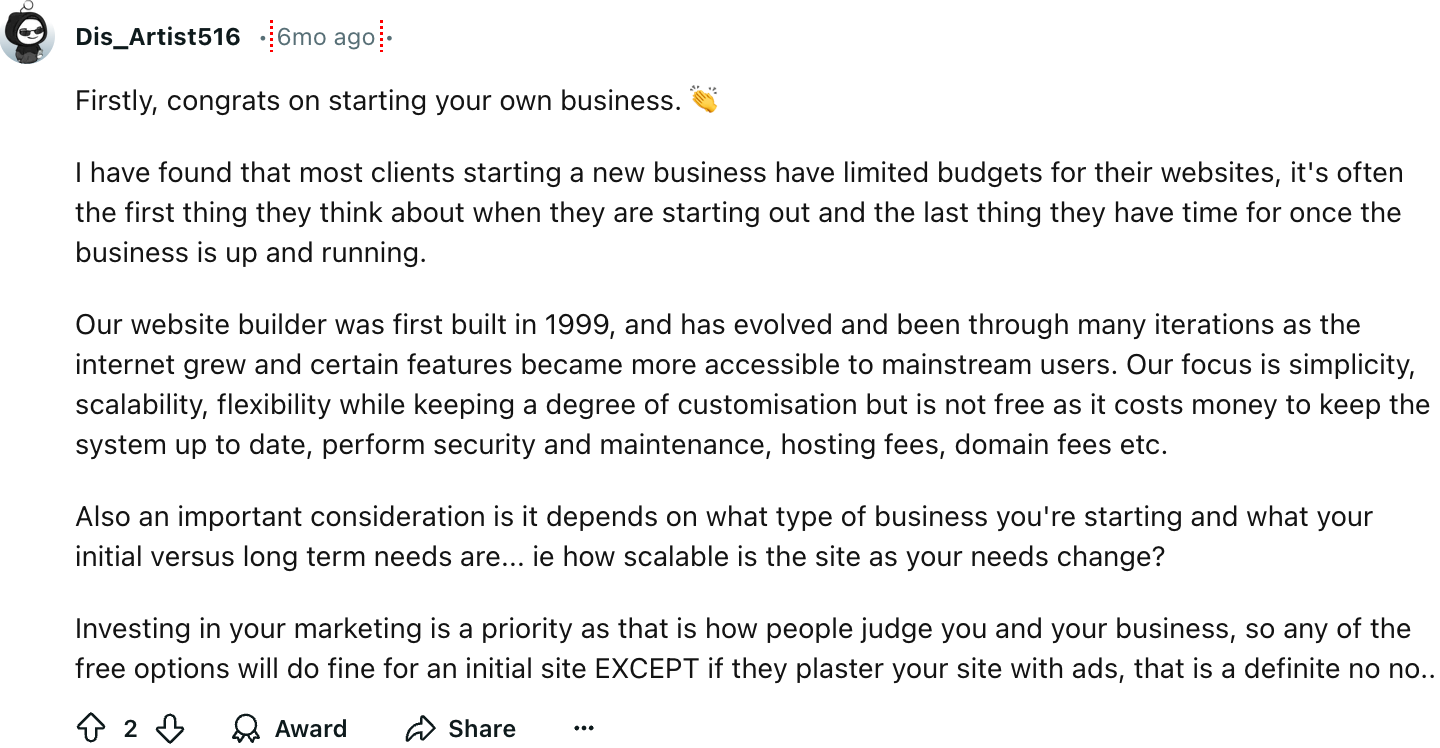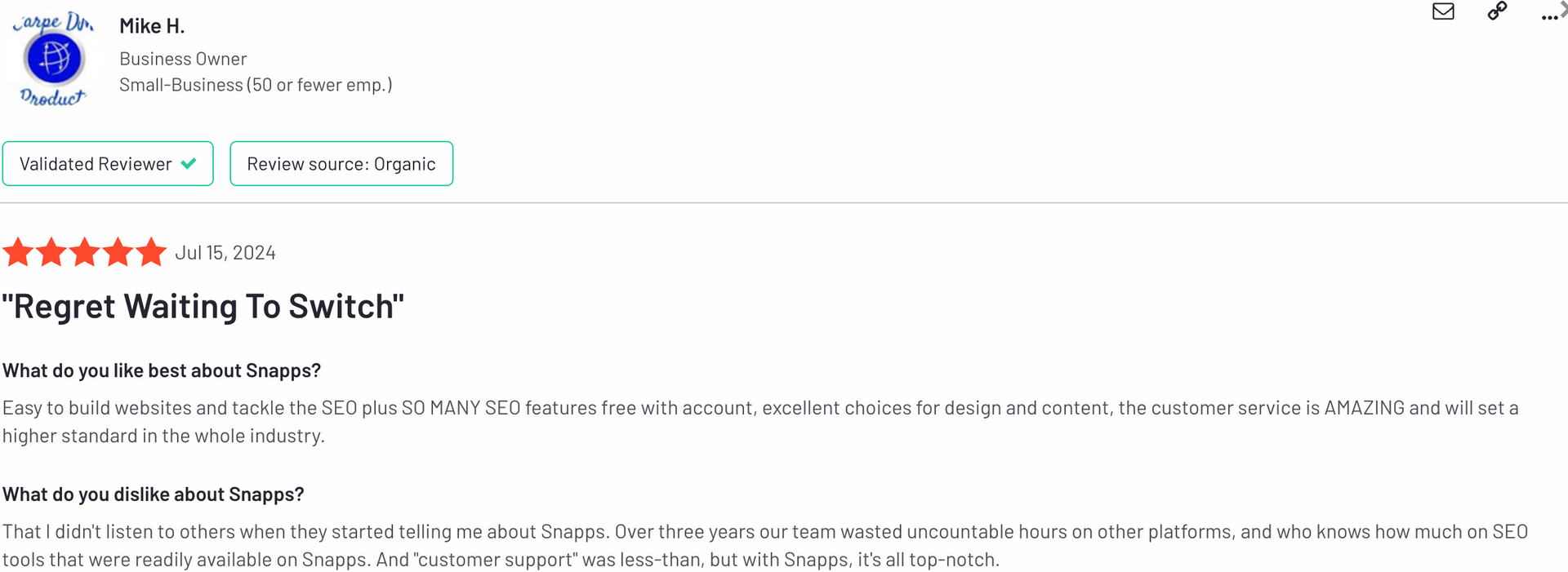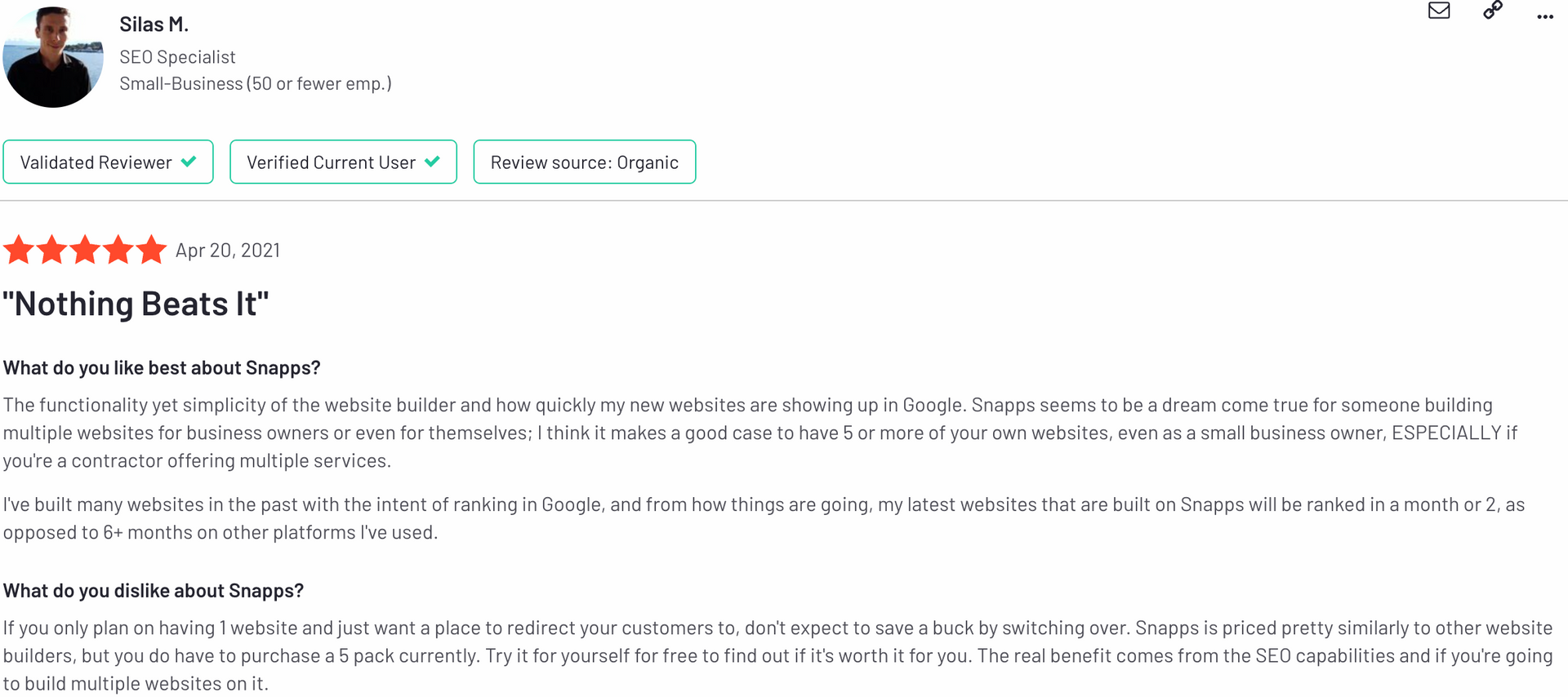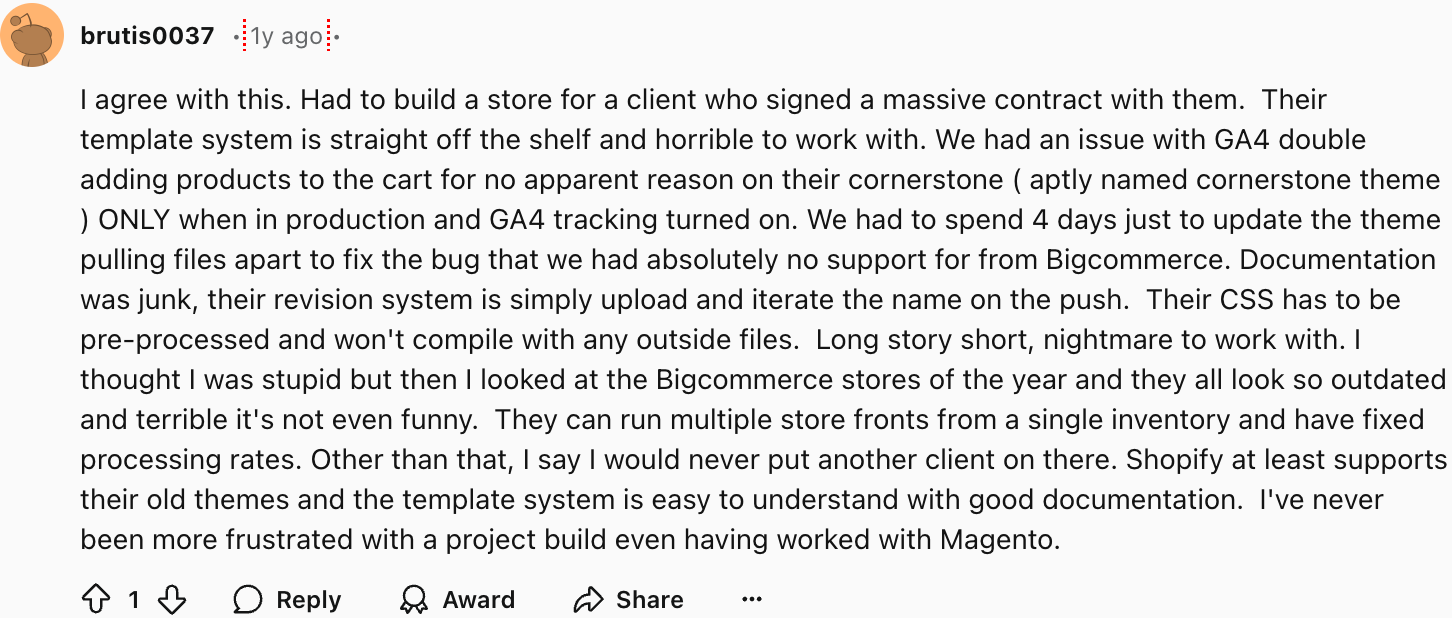Verpex adds that site builders excel without any tech skills or design expertise. Large organizations with multiple team members enjoy user-friendly interfaces and ready-to-use templates. You only need minimal training and build a site quickly.
Snapps courses are now available
The best website builder for large businesses are:
- Snapps.ai
- Shopify
- BigCommerce Enterprise
- Squarespace
- Wix
- Duda
- WordPress.org
- Webflow
Large businesses need website builders that handle operations and boost online image. The best platform for creating a large biz site depends on the features and how scalable they are. Linearity says 88% of shoppers do not return to a site if they encounter website problems. Good thing website builders create better online experiences and deliver excellent customer interactions.
Check what you need now and in the future when selecting a web builder. A Redditor emphasizes considering their budget first, then investing. They add that success comes from solutions that balance simplicity, scalability, and flexibility.


Today, let’s explore the leading solutions for large enterprises. We will focus on options with custom design tools, e-commerce, features, and SEO. All our choices support and grow your expanding business operations.
1. Snapps.ai
Best Pricing Plan for Large Business: Agency Pro Pack at $495.83/month (billed $5,950 annually) for up to 50 sites
Snapps.ai is the best website builder for large businesses. This enterprise-level website builder combines advanced functionality but is user-friendly. Large businesses will love its SEO tools and how it makes website development easier.
The drag-and-drop editor creates sites quickly. If you have a web developer, they have access to special codes for advanced customization. Snapps.ai is for both technical and non-technical team members and here are online store features it includes:
- Advanced Analytics Dashboard: Shows sales, market trends, and lead conversions.
- Custom Payment Gateway Integration: Supports many platforms that process fees with top security.
- Inventory Management System: Tracks your stocks automatically and syncs your multi-location products well.
- Order Processing Automation: Has customizable workflows in fulfilling product deliveries.
Below are features showing how scalable Snapps.ai is:
- Cloud-Based Infrastructure: Host your own websites with 99.99% uptime guarantee.
- Multi-Site Management: Control all your websites from a single dashboard.
- Automated Backup System: Saves your progress every 14 days and restores to previous versions.
- Load Balancing: It boosts your site's performance in high traffic.
Design features to love:
- AI-Powered Design Tools: Creates custom visuals using AI technology.
- Template Library: There are over 200 templates catering to all businesses.
- Custom Widget Integration: Pre-built tools with click-and-drop functionality.
- Responsive Design System: Automatically optimizes websites for all device types.
| Pros | Cons |
|---|---|
| Enterprise-grade security | At least purchase 5 sites |
| Advanced SEO tools included | Learning curve for advanced features |
| Good technical support | Annual billing preference |
| Powerful AI integration | |
| Excellent analytics |
Snapps.ai’s standout feature: SEO toolkit. It automatically optimizes large business sites for search engines and reports what to improve. Mike switched to Snapps and found the SEO tools better than other platforms. Silas also discovers that Snapps speeds up sites to rank in Google searches.


2. Shopify
Best Pricing Plan for Large Business: Shopify Plus at $2,300/month
Shopify is an e-commerce platform with advanced features that adapt well as you grow. The platform has good order management, sells globally, and a good app marketplace.
As a simple platform, you launch online stores without technical knowledge. Web developers also make deeper changes to match your brand well. Here are its e-commerce features:
- Multi-Currency Support: Transactions in over 133 currencies with automatic exchange rate updates.
- B2B/Wholesale Channel: Creates separate stores for bulk buyers with custom prices.
- Automated Order Processing: Handles products and connects with shipping companies.
Features that adapt to your company’s growth:
- Fast Loading Speeds: In 200+ server locations worldwide.
- Shopify Flow Automation: Customizes how you operate your business online.
Designing with Shopify gives you access to:
- Theme Customization: Has over a hundred professional themes with full customization options.
- Mobile Optimization: Whatever your site design is, it adapts in all devices.
| Pros | Cons |
|---|---|
| Good app ecosystem | High transaction fees |
| 24/7 priority support | Many needed features cost extra |
| Worldwide selling features | Limited customization unless you pay more |
| Strong security measures | Closes your store without warning |
| Reliable hosting | Hard to migrate to another platform |
Shopify is great for online sales, but Reddit users say big businesses get stuck with it. They had to face higher costs and lacked features they needed.


Steve Chou loves Shopify’s top plan, support, and control. His only problem was the high cost and risks of suddenly closing your large store. The basic platform lacks some features that force you to spend on extra tools.
3. BigCommerce Enterprise
Best Pricing Plan for Large Business: Enterprise Plan (Starts at $300/month)
Bigcommerce handles high-volume sales and many store locations. The platform boasts its unlimited capacity, strong security, and manages large product catalogs.
Setting up a BigCommerce store needs more of your time. The platform comes with essential business tools but has a complex backend. Business owners must master all features and settings before store launch. Some e-commerce features to master:
- Sales Tools: Creates discounts, gift cards, and abandoned cart recovery emails.
- Order Processing: Handles large orders with location-based shipping rules.
BigCommerce’s features for scalability:
- Storage Space: Upload unlimited products and images but not worrying about site speed.
- Traffic Handling: When there are large visitor numbers, BigCommerce performs well.
- Sales Tracking: Watches store performance and presents reports about what to improve.
BigCommerce’s design features:
- Store Themes: Comes with paid and free themes with basic customization options.
- Content Editor: Changes text and images with built-in editing tools.
| Pros | Cons |
|---|---|
| Handles large orders | Complicated backend system |
| Good security features | Outdated theme designs |
| Good store support | Hard to customize themes |
| Unlimited storage | Poor documentation |
| Built-in analytics | Difficult to learn |
A Reddit commenter shares their experience about BigCommerce’s design and development. They say the platform's templates are outdated and its system has bugs. The tasks that should be simple become complicated to use. Though it manages stores in one system, simpler alternatives exist.

4. Squarespace
Best Pricing Plan for Large Business: Advanced Commerce Plan at $52/month
Squarespace attracts large businesses who focus on the design of their website. The builder creates a polished appearance and integrates marketing tools well. Its built-in features are for brand management, email campaigns, and shopper segmentation.
Squarespace guides those without coding knowledge to build simple yet functional platforms. It avoids overwhelming menus, so it is easily customizable. Squarespace’s e-commerce and marketing features are:
- Shopper Segmentation: Divide first-time buyers and VIPs for better marketing.
- Subscription Sales: Creates membership plans and recurring payment options for products.
Features on how the platform handles your business growth:
- Email Marketing: Sends campaigns directly to shoppers without third-party tools.
- Content Management: Make other members contribute, but only to an extent that you allow.
- Asset Library: Stores and organizes all media files in one location.
Squarespace’s customization features:
- Style Editor: Changes fonts, colors, and layouts across the entire site at once.
- Media Integration: Adds videos, images, and music players easily.
| Pros | Cons |
|---|---|
| Beautiful templates | Limited e-commerce features |
| Easy to use | Slow loading times |
| Good support team | Basic membership tools |
| Built-in marketing | Restricted customization |
| Clean interface | Average performance |
A Redditor notes Squarespace’s reliability and good support, but its newer membership areas and email marketing tools fall short. These features are not as functional for complex business needs.


According to Cybernews, Squarespace’s strength is in its templates, but the 2.5-second load time affects search rankings. If you want advanced ecommerce features, the highest tier plan is what you need.
5. Wix
Best Pricing Plan for Large Business: Business Elite Plan at $159/month
Wix serves 250 million users in 190 countries, bringing stability and reliability. This cloud-based hosting platform provides access to websites wherever they are. It also has good marketing and SEO tools to grow online presence.
Wix has 800+ customizable templates for large business sites and a point-and-click editor. Three editing modes exist: standard, Velo Dev for coding, and Editor X for advanced design. In those three editing modes, here are a few e-commerce features:
- Online Store Setup: Creates product catalogs with unlimited items and variations.
- Customer Accounts: People register and then you track their recent purchases.
Features that support business growth:
- Storage Space: If you get the highest pricing plan, you get unlimited storage.
- Traffic Handling: Handles your visitors all at once without crashing.
A feature that designs your Wix website well:
- Custom Code: Allows JavaScript and CSS modifications for advanced users.
| Pros | Cons |
|---|---|
| Large app marketplace | Slow loading speeds |
| Multiple editor options | Limited template switching |
| 24/7 support | Not fully mobile responsive |
| Plenty templates to choose from | Template lock-in |
| Built-in marketing tools | High-tier plan costs |
A Redditor points out that Wix websites run slowly even if your content’s few. There’s too much code happening in the background that slows down pages. This hurts your rankings and frustrated visitors. Sometimes your site design won’t work well on phones and you need to start over when it happens.

6. Duda
Best Pricing Plan for Large Business: White Label Plan (Starts at $149/month)
Duda is good at content management from stakeholders. It personalizes your website well and adapts to visitor behaviour.
The platform features a layer-based system for photo editors. Arrange widgets visually, stacking them or moving them in sections. The e-commerce features Duda highlights are:
- Store Setup: Creates online shops with product galleries and shopping carts.
- Product Management: Organizes items with pictures, prices, and stock levels.
- Order Tracking: Watches sales and manages orders in one place.
Duda’s reliable features are:
- Content Collection: Gathers website content from other platforms through special links.
- Rules System: Shares different content based on visitor location or time.
The platform designs your website with:
- Section Builder: Moves website parts around like building blocks.
- Special Effects: Adds holiday themes and custom pop-ups easily.
| Pros | Cons |
|---|---|
| Good team tools | Very expensive plans |
| Easy content sharing | Limited free apps |
| Holiday features | Dishonestly persuade others to join them |
| Mobile editing | Copied custom features |
| Content collection |
Duda sends direct offers to clients of its partners, trying to 'steal' them. The website builder also copies features that the Redditor develops, making it hard for visibility. Also watch out for the high prices!

7. WordPress.org
Best Pricing Plan for Large Business: Premium plan at $20 monthly for hosting
WordPress.org lets you take full control through its open-source platform. The software powers over 43% of all websites, with customization, security, and high-traffic handling. However, some struggle with the plugins, and some features may need coding skills.
WordPress is simple to operate with its block editor and page builders. The plugin library adds any feature your business needs without starting from scratch. It attracts clients through these features:
- Store Builder: Adds online shops with WooCommerce plugin to control your store better.
- Product Tools: Creates product pages with pictures and details easily.
The platform grows your business by:
- Traffic Tools: Handles many visitors with good hosting.
- Form Builder: Make contact forms and signup pages easily.
WordPress’s design features are:
- Theme Choice: Picks from thousands of free and paid themes.
- Media Library: Stores and organizes all website pictures and files.
| Pros | Cons |
|---|---|
| Complete control | Security risks |
| Many plugins | Regular updates needed |
| Custom coding option | Complex setup |
| Free software | Technical knowledge required |
| Large community | Plugin conflicts |
WordPress.org is flexible and customizable, but it needs constant updates. To maintain your site well, you need technical knowledge. Understand hosting, domains, and basic web technicalities before opting for this platform.
8.Webflow
Best Pricing Plan for Large Business: Enterprise Plan (Starts at $2,500/month)
Webflow creates visually appealing biz sites. Companies add animations, manage content, and advanced interactions without code. This flexibility maintains your brand identity while operating your website.
Webflow is like using a design software where you adjust elements through the side panel. The platform needs more time to learn to complete design freedom. If you want to sell, Webflow boasts the following features:
- Shop Setup: Builds stores with custom product layouts and categories.
- Order Management: Tracks sales and manages shipping with visual tools.
Webflow is also scalable because of the tools below:
- Content System: Handles up to 10,000 items in the business plan.
- Site Search: Adds smart search features for large websites.
Here are features that maximize your visuals:
- Visual Editor: Moves and styles elements without coding.
- Animation Tools: Creates custom movements and effects easily.
- Layout Control: Arranges content with precise positioning.
| Pros | Cons |
|---|---|
| Complete design control | Difficult to learn |
| Professional animations | High cost for features |
| Visual development | A bit complicated |
| Custom interactions | Limited basic plan |
| Strong CMS features | Technical knowledge needed |
A Reddit user encounters a limitation with the basic plan. It doesn’t have the Client Editor feature. Designer tools are complicated, making it hard for non-technical businesses to update content.

Factors to Consider in Choosing Large Business Website Builders
- Security and Compliance: Must protect customers’ data and meet industry standards.
- Scalability Potential: Should handle traffic well and grow content without problems.
- Technical Support Level: Support teams must address issues quickly.
- Cost Structure: Look out for website builders with hidden fees. You should know the total cost of a plan before subscribing.
- Migration Flexibility: Website builders need to smoothly process switching to other platforms.
- Future Development: Should update your business about new features and improvements.
How to Optimize Large Business Websites for SEO?
- Build a strong website foundation. Create clear site maps using XML for search engines to understand your website. Also, use simple URLs.
- Make your site mobile-friendly. Your website needs to function well on all devices. Google loves sites that are optimized for phones and tablets.
- Speed up your website. Cut the size of your images. Use caches to load your pages faster.
- Create good content. Write information that answers what shoppers are searching for.
- Connect your pages. Link related pages together to make navigation easy.
- Write better page descriptions. Each page needs to have clear titles and descriptions showing up in search results.
- Add Schema Markup. This is a special code for assisting searching engines in understanding your pages.
- Track your progress. Use analytics tools to watch your site’s performance and make improvements.
- Focus on local search. To optimize your site for local SEO, optimize for each of your locations. Then, keep your business information updated online.
- Improve user experience. Meet the standards set by Google’s Core Web Vitals and maintain your site’s speed.
What is the Best Platform to Create a Business Website?
Snapps.ai is the best platform to create a business website. It's better than competitors for its perfect balance of power and ease of use. Enterprise-grade security and scalability make it easy to use for non-coders.
The platform excels in supporting large teams while its pricing remains transparent. The platform has deeper customization options, unlike other platforms. Snapps.ai assists over 100 companies and makes their life less complicated.
Snapps.ai is the next big thing in website building technology. Stay ahead of digital trends and start using the platform as soon as you’re ready.
Recent Articles
Our Support Heroes Are Here For You
Don’t waste time on tedious manual tasks. Let Automation do it for you. Simplify workflows, reduce errors, and save time for solving more important problems.



